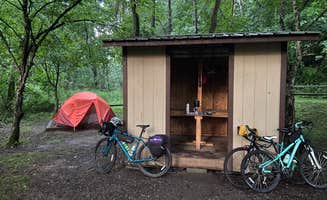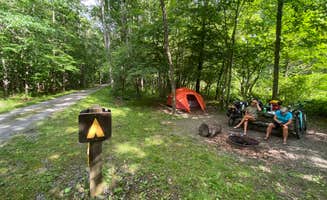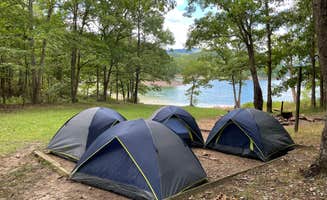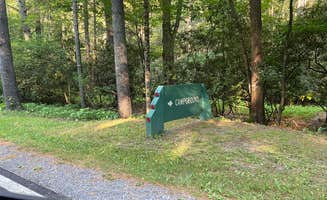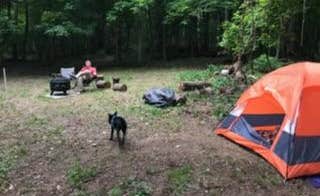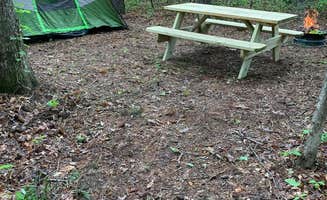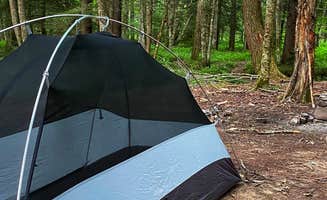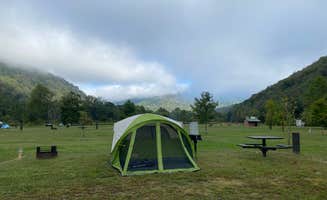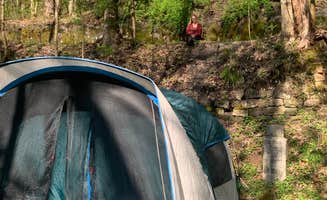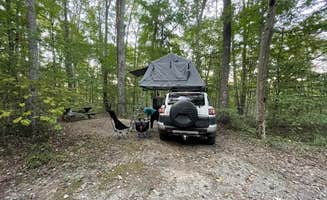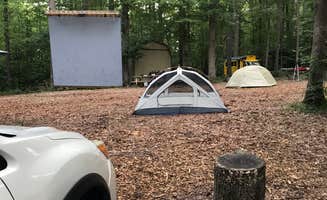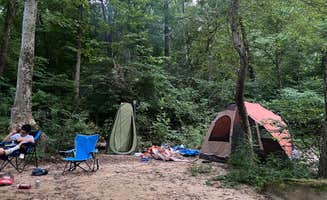Tent campsites near Hillsboro, West Virginia lie within the Monongahela National Forest region, which spans over 919,000 acres and ranges in elevation from 1,000 to 4,863 feet. The area experiences significant seasonal temperature variations, with summer nights often dropping into the 50s even when daytime temperatures reach the 80s. Primitive camping areas along the Greenbrier River Trail feature distinctive Adirondack-style shelters at several sites, providing alternatives to tent camping during unexpected weather changes.
What to do
Wildlife observation opportunities: The Greenbrier River Trail camping areas offer excellent wildlife viewing, particularly at Greenbrier River Trail MP 69.6 where visitors can watch animals at dawn and dusk. A camper noted, "The amount of wildlife we saw throughout the day was incredible while biking the trail. Mostly deer, rabbit, chipmunks and Eastern Box Turtles sharing the trail...but we did see a few turkey, fox and bobcat."
Stargazing after dark: The Monongahela area offers rare dark sky viewing for eastern United States. As one visitor to Meadow Creek Camping Area explained, "There are very few places in the Eastern United States that get dark enough to view the Milky Way. If you're in the Monongahela area and you've never seen it before, definitely head up to Spruce Knob on a clear night."
Water activities: Many river-adjacent sites provide swimming access during warmer months. The McClintic Point Primitive Campground offers lake access for paddlers, with one camper stating, "There is access to the lake for canoes/kayaks."
Bikepacking adventures: The 80-mile Greenbrier River Trail with its gentle 1% downgrade makes an excellent multi-day trip for all skill levels. Most primitive campsites along the trail are strategically placed for bikepackers, though shuttle service is necessary for one-way journeys.
What campers like
Privacy and solitude: Many tent sites in this region offer significant separation from neighboring campers. A visitor to McClintic Point Primitive Campground shared, "No neighbors. Maybe we just got lucky. I encourage."
Well-maintained facilities: Despite being primitive, many sites receive regular maintenance. One camper at Greenbrier River Trail Milepost 63.8 Primitive Campsite appreciated, "The WV State Park system is fantastic and the State Park employees take incredible pride in keeping all their parks beautifully maintained despite poor budgets to work with."
Free camping options: Most primitive sites along the Greenbrier River Trail don't charge fees. A camper noted, "All the primitive campsites positioned along the Greenbrier River Trail (GRT) are free, first-come, first-served."
Unique shelter options: Several sites feature Adirondack-style shelters that provide protection from rain. These structures are particularly valued during summer thunderstorms when tents might not provide adequate protection.
What you should know
Bear safety requirements: This region has active black bear populations requiring proper food storage. At Greenbrier River Trail Mile Post 49.3 Primitive Campsite, a camper advised, "This is bear country so I would recommend utilizing a bear bag or bear canister for your food and toiletries. I used a BearVault BV500 that I strapped to the Salsa EXP Anything Cradle attached to my handlebars."
Limited cell service: Most camping areas have no cellular connectivity. One camper listed this as both a pro and con, noting, "No cell service" in both categories, suggesting it's both a blessing for disconnection and a safety consideration.
Water availability varies: While some sites have hand pumps, others require filtering river water. For Mile Post 49.3, "The GRT Mile Post 49.3 Primitive Campsite does not offer a well water, so fill up before you get there. Although, if you utilize a filter, you can draw water from the river or the tributary down the trail several hundred feet."
Weather preparation: West Virginia's mountain climate can bring sudden storms and temperature changes. Pack rain gear even for short trips, as one camper noted, "This is called 'Wet Virginia' for good reason...pack a rain jacket."
Tips for camping with families
Beginner-friendly trails: The Greenbrier River Trail's gentle grade makes it suitable for family biking trips. One visitor stated, "The Greenbrier River Trail is a delightful bikepacking excursion. Very doable for all ages."
Spacious tent sites: Some campgrounds feature tent pads large enough for multiple tents. A camper at Pine Run Camping Area shared, "Tent pad is big enough to fit 2 large tents (that is us)."
Pack toilet paper: Facilities may not be regularly stocked during less busy periods. A visitor to Day Run Campground advised, "Take your own toilet paper if campground isn't busy because it doesn't get maintained daily and we ran out."
Wildlife viewing opportunities: Morning and evening animal sightings make memorable experiences for children. Trail areas with water access are particularly good for seeing diverse wildlife.
Tips from RVers
Site limitations for larger vehicles: Most primitive sites near Hillsboro are tent-only with no accommodations for RVs or trailers. Many locations require walk-in or hike-in access only.
Pack-in, pack-out requirements: Limited trash facilities mean planning ahead for waste management. Bearproof trash receptacles are available at some sites but not all.
Boat-in camping alternatives: For a unique experience, Greenwood Point Campground offers sites accessible only by water. One camper described their experience: "Beautiful quiet lake, not heavily trafficked. Campsite is only accessible via water, so we packed our gear up on paddle boards to get there. It's a private little cove, sites are first come first serve."
Trail access considerations: For those with small trailers who want proximity to trails, look for parking areas near the Greenbrier River Trail access points. This allows day-use of the trails while maintaining a home base with more amenities.


